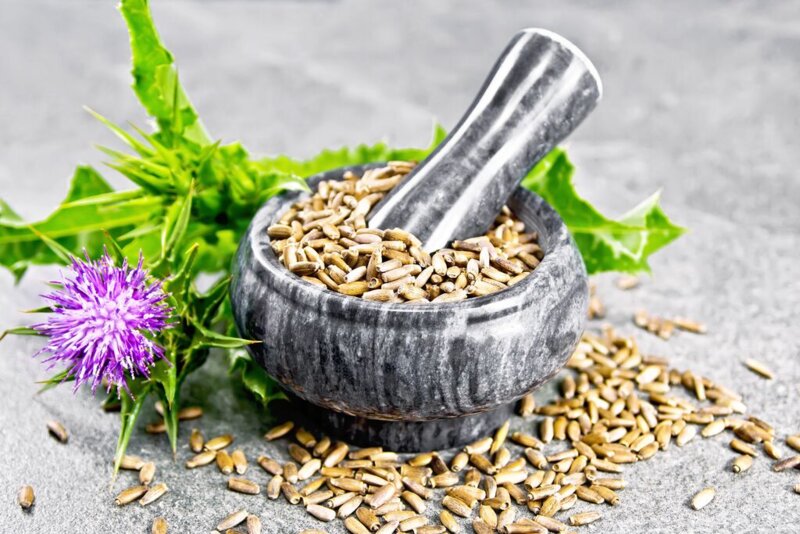- Vegetables: cooked, raw or as a salad
- Fruits rich in water but low in sugar (e.g. watermelons, apples, berries, grapefruits, peaches)
- Unsweetened dairy products and milk substitutes (e.g. skyr, quark, natural yoghurt, blanc battu, cottage cheese, soya yoghurt)
- Low-fat meat and fish (e.g. chicken breast, beef fillet, roast beef, Mostbröckli, cod, tuna, prawns)
- Pulses (either processed into tofu or as a salad made from cooked lentils or chickpeas)
- Eggs
- Nuts, kernels and seeds
- Wholemeal products (e.g. oatmeal, wholemeal bread)
Desired figure (1): how proteins and dietary fibres help you lose weight

If you want to lose weight permanently, you should focus on an active lifestyle and healthy eating habits. With the right mix of exercise, a diet rich in protein and fibre and little everyday tricks, you can not only achieve your feel-good weight, but also keep it off in the long term. We show you how.
We've all been there: summer is just around the corner - but when you look in your wardrobe, you're disillusioned. Your favourite jeans are stretchy and your summer dress is too tight. At this point, many people realise that they need to lose a few kilos.
But where do the excess kilos come from? Basically, it's quite simple: if you consume more calories than your body uses in the long term, you will put on weight. Conversely, if you want to lose weight, you need to consume more energy than you take in (1). The two most important success factors on the way to a feel-good weight are therefore regular exercise and a balanced diet. The right choice of nutrients and foods is particularly important here. Proteins and dietary fibres play a very special role here.
Proteins - filling food with added value
Proteins fill you up and boost your metabolism
Proteins play an important role in weight loss. They keep you feeling full for a particularly long time - for several reasons (3, 4). Firstly, protein-rich food stays in the stomach for longer and is digested more slowly (5) - this prolongs the feeling of satiety. Secondly, proteins stimulate the production of hormones that signal to the brain: "I'm full!" (5).
Another advantage is that the body needs more energy to digest proteins than it does carbohydrates or fats. Around 20 to 30 per cent of the calories from proteins are used for digestion alone - by comparison, this figure is only 5 to 10 per cent for carbohydrates and only around 3 per cent for fats (3).
Stable blood sugar levels thanks to proteins
Proteins help to keep blood sugar levels stable. And a stable blood sugar level prevents cravings. But what is it about blood sugar levels? After eating foods with a high content of quickly digestible carbohydrates, such as white bread or fruit juices, the blood sugar level rises quickly. The body reacts by releasing insulin. This ensures that the sugar is transported from the blood into the cells (6). The faster and more strongly the blood sugar level rises, the more insulin is produced. As a result, the blood glucose level drops rapidly - often even below the initial value. The body interprets the rapid drop as a lack of energy and signals hunger (7), which makes us reach for high-calorie snacks. Protein-rich foods can counteract this, as they cause little or no rise in blood sugar levels (8). The feeling of satiety lasts longer and cravings occur less frequently.
Prevent muscle loss - with protein and strength training
When losing weight, the body not only loses fat, but also muscle mass (1). This is problematic because with fewer muscles, the body also burns fewer calories. If you want to counteract this, you should make sure you have a sufficient protein intake and do regular strength training. Proteins support the maintenance of muscles - and that pays off (9): More muscle mass means a higher basal metabolic rate and therefore also increased calorie consumption (10).
Dietary fibre - more than just a filler
Dietary fibres satiate faster and longer
Dietary fibres, also known as roughage, are real all-rounders when it comes to keeping you full - and with practically no calories. They bind water and swell up in the stomach. This increases the volume of the meal and makes you feel full more quickly (11). What's more, the food stays in the stomach for longer, making you feel fuller for longer (12).
Dietary fibres stabilise the blood sugar level
Blood sugar levels also benefit: After a meal with lots of dietary fibre, it rises more slowly and less sharply. This helps to maintain a feeling of satiety for longer and prevent cravings (12). In addition, food fibres, like proteins, stimulate the release of satiety hormones. This makes us feel full more quickly (12).
Get moving
If you want to lose weight, there's no getting round exercise. Physical activity burns calories, can prevent muscle loss and has a positive effect on general well-being (1). Just half an hour of exercise a day can make a big difference. And it's not just sport that counts, exercise in everyday life can also increase energy consumption (2):
- Leave the car at home more often
- Get off the bus or tram one stop earlier
- Take the stairs instead of the lift
- Active leisure activities (dancing, hiking, swimming, cycling, etc.)
Long-term success through healthy eating habits and an active lifestyle
One-sided crash diets, in which calorie intake is severely restricted, can lead to quick success, but are rarely long-lasting. The body reacts to the very low energy intake by switching to "economy mode": it gets by with much less energy. However, as soon as you start eating normally again, the weight goes back on - the well-known yo-yo effect. The reason for this is that the body is still running on economy mode and storing fat deposits for a rainy day (1). The better solution? A long-term switch to a balanced, healthy diet and an active lifestyle.
6 tips for everyday life
-
Eat slowly: If you take your time, you usually eat less. The feeling of fullness only sets in after about 15-20 minutes.
-
Drink plenty and regularly: At least 1.5 to 2 litres of water or unsweetened tea daily. Tip: A glass of water before a meal can help you eat less.
-
Learn to distinguish between hunger and appetite: Knowing the difference helps you to eat more consciously. Real hunger signals can be felt physically (rumbling stomach, hole in the stomach, etc.) - appetite, on the other hand, is often emotionally driven.
-
Reduce stress: Constant stress increases the hormone cortisol, which favours fat storage (13). Relaxation techniques such as yoga, meditation, regular breaks in everyday life and exercise help to reduce stress levels.
-
Get enough sleep: Studies have shown that People who sleep too little are more prone to cravings and gain weight (14).
-
Choose food consciously: We recommend foods that fill your stomach, make you feel full and have relatively few calories. Healthy, filling foods that contain lots of fibre, high-quality protein or healthy fats, for example (15):
Healthy fillers
Recommended article
Sources:
(1) SGE 2024a. Schweizerische Gesellschaft für Ernährung. Merkblatt Schlankheitsdiäten. Aktualisiert 2024. https://www.sge-ssn.ch/media/ct_protected_attachments/3a0818c98830e6d5bfc36bba0cd9ac/SGE_MB_Schlankheitsdiaeten_DE.pdf Zugriff am 30.04.2025.
(2) SGE 2024b. Schweizerische Gesellschaft für Ernährung. Im Gleichgewicht – Informationen zum gesunden Abnehmen. Aktualisiert 2024. https://www.sge-ssn.ch/media/ct_protected_attachments/03a31aa744c6c1ae5ce04a898a1302/SGE_MB_im_Gleichgewicht_DE.pdf
(3) Leidy HJ, Clifton PM, Astrup A, et al. The role of protein in weight loss and maintenance. Am J Clin Nutr. 2015;101(6):1320S-1329S. doi:10.3945/ajcn.114.084038.
(4) Drummen M, Tischmann L, Gatta-Cherifi B, Adam T, Westerterp-Plantenga M. Dietary Protein and Energy Balance in Relation to Obesity and Co-morbidities. Front Endocrinol (Lausanne). 2018;9:443. Published 2018 Aug 6. doi:10.3389/fendo.2018.00443.
(5) Giezenaar C, Lange K, Hausken T, et al. Acute Effects of Substitution, and Addition, of Carbohydrates and Fat to Protein on Gastric Emptying, Blood Glucose, Gut Hormones, Appetite, and Energy Intake. Nutrients. 2018;10(10):1451. Published 2018 Oct 7. doi:10.3390/nu10101451.
(6) Holesh JE, Aslam S, Martin A. Physiology, Carbohydrates. [Updated 2023, May 12]. In: StatPearls [Internet]. Treasure Island (FL): StatPearls Publishing. https://www.ncbi.nlm.nih.gov/books/NBK459280/.
(7) ARD Gesund. Glykämischer Index: Auf die richtigen Lebensmittel kommt es an. (2022, 26. August). https://www.ndr.de/ratgeber/gesundheit/Glykaemischer-Index-Auf-die-richtigen-Lebensmittel-kommt-es-an,gi100.html#:~:text=Nahrungsmittel%20mit%20einem%20hohen%20Glyk%C3%A4mischen%20Index%20f%C3%BChren,und%20darauf%20reagiert%20der%20K%C3%B6rper%20mit%20Hei%C3%9Fhunger. Zugriff am 01.05.2025.
(8) Wolever TM, Zurbau A, Koecher K, Au-Yeung F. The Effect of Adding Protein to a Carbohydrate Meal on Postprandial Glucose and Insulin Responses: A Systematic Review and Meta-Analysis of Acute Controlled Feeding Trials. J Nutr. 2024;154(9):2640-2654. doi:10.1016/j.tjnut.2024.07.011.
(9) Moon J, Koh G. Clinical Evidence and Mechanisms of High-Protein Diet-Induced Weight Loss. J Obes Metab Syndr. 2020;29(3):166-173. doi:10.7570/jomes20028.
(10) Stemper T. Stärkere Muskeln erhöhen den Grundumsatz. Fakt oder Fiktion? Fitness und Gesundheit (F&G). 2015;3:86-91.
(11) Jovanovski E, Mazhar N, Komishon A, et al. Can dietary viscous fiber affect body weight independently of an energy-restrictive diet? A systematic review and meta-analysis of randomized controlled trials. Am J Clin Nutr. 2020;111(2):471-485. doi:10.1093/ajcn/nqz292.
(12) Akhlaghi M. The role of dietary fibers in regulating appetite, an overview of mechanisms and weight consequences. Crit Rev Food Sci Nutr. 2024;64(10):3139-3150. doi:10.1080/10408398.2022.2130160.
(13) van der Valk ES, Savas M, van Rossum EFC. Stress and Obesity: Are There More Susceptible Individuals?. Curr Obes Rep. 2018;7(2):193-203. doi:10.1007/s13679-018-0306-y.
(14) Kracht CL, Chaput JP, Martin CK, Champagne CM, Katzmarzyk PT, Staiano AE. Associations of Sleep with Food Cravings, Diet, and Obesity in Adolescence. Nutrients. 2019;11(12):2899. Published 2019 Nov 30. doi:10.3390/nu11122899.
(15) Worm N, Mangiameli F, Lemberger H. Die neue Logi Diät. Mediterran abnehmen- wissenschaftlich basiert, 4. Auflage., München, Rivaverlag, 2024.










